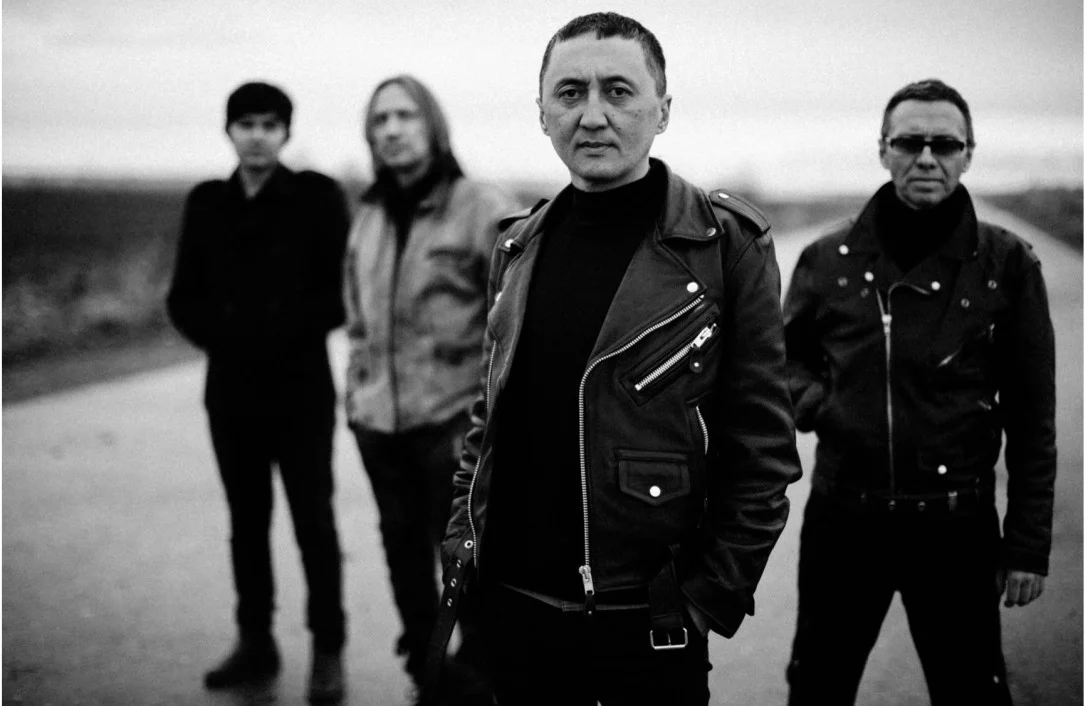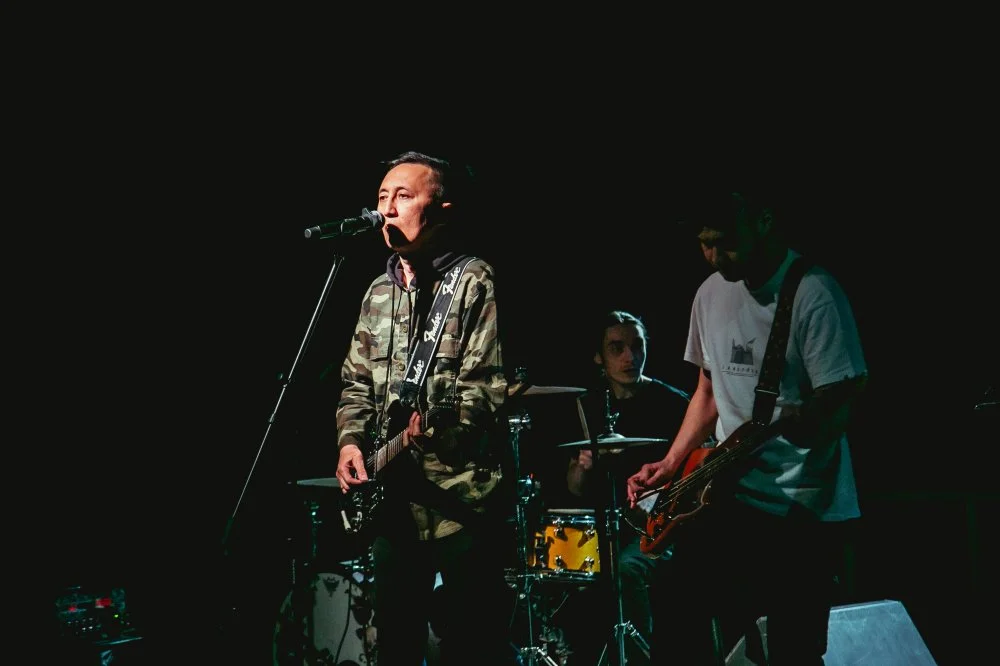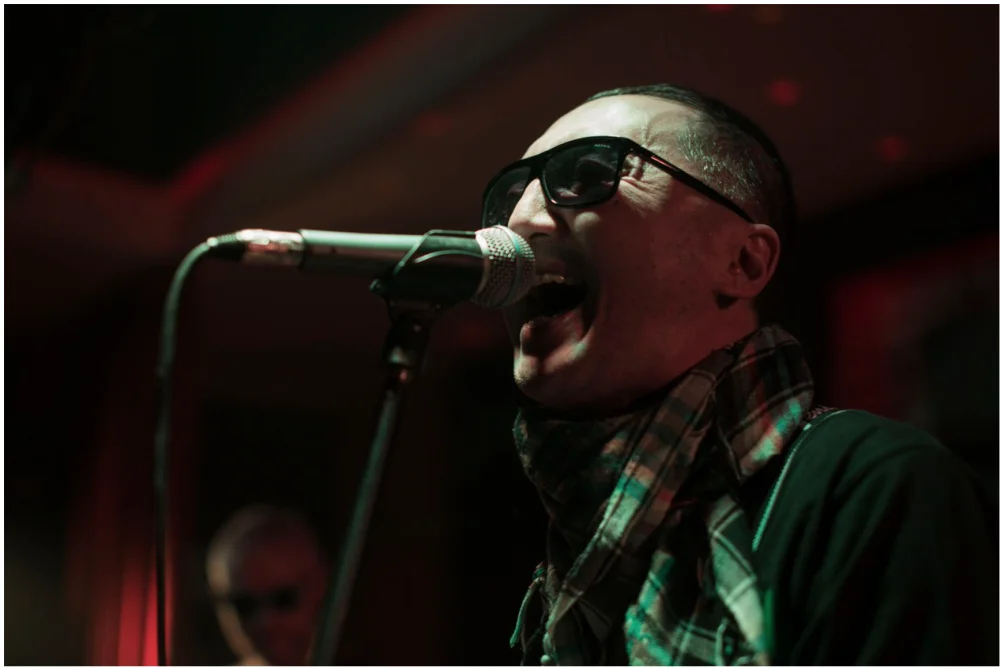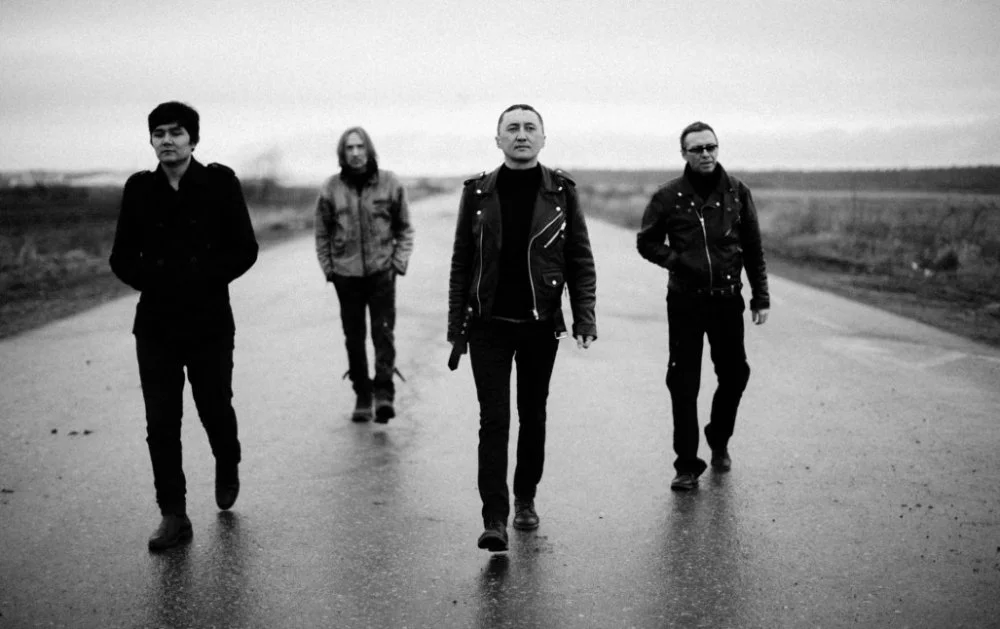
"Adaptatsiya" band in 2016 / Photo by Vladimir Petrov
The poet and musician Yermen Anti Yerzhanov founded the band Adaptatsiya "Adaptation" in Aktobe more than thirty years ago. In spirit and energy, Adaptatsiya are the brightest representatives of the style commonly called existential punk. Unlike most of their peers, Adaptatsiya not only survived, but became the most touring band of the underground and rose to the European level, going from homemade "Magnetizdat" to their own label. Suffice it to say that the band once included musicians from the famous Russian bands Alisa and DDT. This year in Germany, 48-year-old Yermen Anti published two books at once — poems and memoirs. We publish excerpts from the book Nomad Punk and together with the author recall the history of the country through his lens.
“When we came out to play, the atmosphere in the hall was like a company party: everyone knew each other, acted relaxed, drank and enjoyed life. Against the backdrop of a respectable audience, we looked like young stragglers, dressed in ripped jeans with the inevitable pins and patches. Korney smeared his hair with multicolored cream from a stolen cake and wanted a mohawk, but ended up with a voluminous bob, like Elvis Presley or rockabilly fans. We started with Anarchy and it was immediately clear from the audience's reaction that our loud music was spoiling people's party. The second was Shoshkanyn-etin.
“Men — shoshka! Sen — shoshka! Ol — shoshka! Biz shoshkalar!” — I shouted into the microphone, and the ungrateful audience did not realize that they were witnessing a historic moment — the first performance of punk rock in the Kazakh language.”
- Are you sure that nobody played punk rock in Kazakhstan before you?
- Actually, a vinyl collector told me after our debut that there was a band in Karaganda in the 90s called Aldar-kose and inflatable baursaks. They released a 45 in Europe on one of the indie labels. But what they had was instrumental, I think. Anyway, I wrote my first song in Kazakh in '92. I read in one of Yegor Letov's interviews that there are bands from the Philippines and Thailand in global punk compilations. I was so surprised that there was punk in Asia that I decided I had to write something in Kazakh. And since I grew up in a Russian-speaking environment and graduated from a Russian school, I realized that I wouldn't be able to compose in Kazakh as fluently as in Russian. Although I understand spoken Kazakh well, I can watch movies, my family spoke Kazakh. In the end, I approached it conceptually: we took the theme of pork, fully aware that there was a certain extremism in it, I wrote a basic text, and it all worked together. The first few times we did it, people were shocked. But I didn't want to simply write songs in Kazakh, I wanted to fill a certain gap. After all, if there is punk rock in the Philippines and Thailand, it wouldn't hurt to have it in Kazakhstan.
- But it's hard to build such a long story on a single mention of the Philippines. Where else did you get your information during those years?
- There was a lack of information. Sometime in the early nineties, there were no bookstores left in Aktobe. We used to rummage through libraries; everything they managed to publish during perestroika was taken away for reading, or simply stolen. I remember opening the Soviet six-volume set of Kurt Vonnegut and seeing that no one had taken it before me, it had been sitting there untouched for years, so I just took it. When I stayed with Usov in Moscow, and he had a big library (Boris Usov-Belokurov, the late leader of the band Straw Raccoons [Solomenniye yenoty], the unofficial leader of the Moscow existential punk of the 90s. — ed.), I always took something from him to read until my next visit. It was the same with music: if someone came to Moscow, we would write him a list of bands: go to the Arbat, to a stall, the guy would bring a couple of cassettes, and immediately there would be a line of people who wanted to re-record them with tape recorders. During perestroika it was good in this respect, because even the official publications, which paid tribute to fashion, wrote about rock music. For example, there was a paper called Komsomolskaya Zhizn [Komsomol Life], which came out twice a month, in which Vadim Usmanov of Mr. Twister wrote a column about old rock'n'roll. They also wrote about [Viktor] Tsoi, Vezhlivyi Oktaz [Polite Refusal], Auktyon, printed texts with chords. The magazines Selskaya Molodezh [Rural Youth], The Sail [Parus] — they wrote about whole layers of the underground, even from the anti-Soviet Urlight there were reprints. By the way, do you know that the last issue of Urlight was printed in 1991 and was confiscated by the Kazakh authorities as a Komsomol production? It was still freely available in Almaty in local rock shops in the late 90s.
- These were USSR-wide publications; were there any Kazakhstani magazines of this kind? I remember the magazine Prostor [‘Expanse’].
- Well, Prostor was a literary magazine. There was Karavan where they wrote about rock, there was also a local Almaty newspaper Horizon where, I remember, there was an interesting article about Grazhdanskaya Oborona [‘Civil Defense,’ Russian rock group] — “The Legendary Yegor” [Letov, the group's frontman]. When they later put together a book-length collection of materials about Letov called I Do Not Believe in Anarchy, that article was not there. Also in Almaty was Evgeny Bychkov, a great melomaniac, educator, friend of Artemy Troitsky. In 1990 he published an excellent book about Pink Floyd, it was sold in our "Soyuzpechat" stalls. And in '94, after Alexander Kushnir and Sergei Guryev's book The Golden Underground, the renaissance of samizdat began — its last flowering before the arrival of the Internet. I received packages from different cities, a huge number of worthy editions: Oak Bark [‘Kora duba’], The Ham [‘Okorok’], Walks of the Wounded [‘Progulki ranenykh’]. In Aktobe there was a good samizdat magazine Alga.
"Another reunion of Bishchara-Baldar took place already in the next century. On September 30, 2000, a joint concert of Adaptatsiya, Belkanov Band and Bishchara Baldar was held in the auditorium of one of the schools on the outskirts of the city. At that time in Aktobe it was very difficult to find places for concerts. Clubs did not exist yet, cultural centers were closed to us, and the name Adaptatsiya was associated with something forbidden and lawless due to publications in the local media, so most cafes that had a stage and equipment refused to rent it to us.
So our choice fell on educational institutions: schools, colleges and universities. One of our friends, dressed in a respectable outfit, would come to the school director and introduce himself as the manager of the Belkanov Band, and then ask for help in organizing a concert. When asked what this music group played, the answer was usually: art and jazz-rock. Then came the promise of a full hall (200-300 people) with a respectable audience and a good percentage of the ticket price. Usually this scenario worked, and in the end the concert was packed with about a hundred fans of punk rock, half of them without tickets, who behaved as was customary at such events. The management was shocked and swore to the organizers that they would never do business with them again, but that didn't scare anyone because we knew from the beginning that we wouldn't be allowed to use that venue a second time.
A few weeks before this concert, the main hit of Bishchara Baldar was written — the song Aldar-kose. For those who do not know, Aldar-kose is a hero of Kazakh fairy tales, a local analog of Robin Hood, Hodja Nasreddin and Till Eulenspiegel at the same time, who put the rich in their place and helped the poor. The lyrics of the song were a children's counting rhyme that my father used to tell me in my childhood, and the refrain was the name of Aldar-kose.
The explosive cocktail of punk, disco and ska made it such a hit that we played it at Adaptatsiya concerts for the next twenty years until the band disbanded.
- Let's say there was no punk in Kazakh, but did some local music inspire you?
- There was a band called Dos-Mukasan, my parents had a record, but to be honest I didn't appreciate it at the time. Many years later I listened to it again and realized that these people loved The Doors and psychedelic rock, but because they were in the Komsomol and the Philharmonic environment, they had to find a balance between rock'n'roll and the Philharmonic.
They found a way out and had a lot of fun with instrumental compositions: for example, Betpak dala is a cool psychedelic piece. In the 90s in Europe the price for a Melodiya [Soviet record label] Dos-Mukasan record was up to 700 euros. And here it was released in quite a large edition.
- But Dos Mukasan was still officially sanctioned. Were there any independent groups?
- In our city, we were in a deep provincial backwater in that respect, and we were immediately confronted with the older generation of musicians. They loved The Beatles and Pink Floyd, well, Queen too, those were their main idols. They played at weddings, had their home base in the factories, socialized with the Komsomol, and obeyed the law that 70 percent of the repertoire had to be songs by Soviet composers.
- In the late 80s and early 90s it was still theoretically possible to release a record with Melodiya.
- One band of that generation actually released a record with Melodiya in a small edition. It was a band called Triumvirate from Almaty, they played such abstruse art rock, and then they moved to St. Petersburg in the '90s and even joined a rock club, but it was hard to break through with that kind of music at that time. I remember asking an old musician: “You couldn't be ignorant of the fact that in St. Petersburg there were people like you — Aquarium, Kino, Zoopark — who were trying to do something of their own.” He replied: "Yes, we heard something, we had tapes, but we preferred The Beatles."
- There was no new wave at all in Aktobe, everyone was playing art or hard rock. So when we came out, no one took us seriously. It was thought that we couldn't sing or play, our minimalism and screw-it-all attitude was rejected by many people. And since we were not accepted by the local rock community, we formed our own. By this time we had heard that Letov and Sudakov had founded the All-Siberian Punk Club in '88, and although we had no idea how exactly they organized it, we immediately realized that it was a cool underground thing. Literally three months later, after I gathered Adaptatsiya, we started the first parallel project Gopnik's Band [gopnik is a slang word for thug and/or lowlife] and announced the creation of a punk club, and in 1994 we organized the first Kazakhstani punk festival Sasyk (which is “stench” in Kazakh) in Aktobe. When we came to Moscow on the first tour, there were four of us, and that made four groups: I sang in one, played drums in another, and played guitar in the third. There was no competition, everybody influenced each other, everybody helped each other with the recordings. It went on like that for eight or ten years, then the energy of the phenomenon started to fade.
- Were there any interesting bands outside your punk club?
- There was an impressive band in Almaty called Alternativnaya Kosmonavtika [Alternative Cosmonautics], we played with them a couple of times. It is a mixture of Russian rock and punk, with show elements, with two singers. Their leader Sergey Bugayov died at the beginning of the 2000s. There was an interesting crowd in Almaty — when we first came here there was already a Rock Laboratory, and on our first visit we played at a big festival. There were punks called Oralnyi orgazm [Oral Orgasm] in particular, and they just blew us away. They played like the Dead Kennedys, although their lyrics sucked, kind of like a dumbed-down Svinya [Pig; that's Andrei Panov, leader of Avtomaticheskie udovletvoriteli — Automatic Satisfiers — ed.], but as musicians they played perfect Western hardcore, which was the first time I heard hardcore live.
The CD Punk Rock du Kazakhstan was released in France in May 2004. Bishchara Baldar was represented by five songs (Aldar-kose, Zhalgyzdyk, Nazarbayevpen telefon arkyly soylesu, Kotakty zheme, Shoshkanyn eti) and the instrumental composition Kuy No. 1, which opened the side of Bishchara Baldar. Kuy is a traditional Kazakh instrumental piece played on the domra or kobyz. I composed it on the domra and then arranged it for guitar. The album features the painting Disobedience by our friend, Aktobe artist Kuanysh Bazargaliyev.

Yermen Anti at the "ARTiSHOK" theatre, photo by Alina Bagautdinova
- When the French released your record, did they seem to be guided by the same Letov logic — to demonstrate an Asian punk curiosity?
- Yes, the Kazakh exoticism was important to them; they specifically asked us to record the songs in Kazakh. We made a split: the first side was Adaptatsiya, and on the second side was everything we had composed as part of the Bishchara Baldar project. By the way, I recently met in Bishkek with the French people who were involved with us at that time, who now work in Kyrgyzstan. They told me that they had recently been in Toulouse, and there they still remember the song Aldar-kose as a big hit on the student radio.
- What was Aktobe like in your youth?
- A Soviet industrial city. We had a big ferroalloy factory, it still exists. A lot of factories closed down in the nineties, they were sold off, but this one stood firm. It was a dream to get a job there, because they paid good wages and, most importantly, on time. The city itself — about 300 thousand people, several universities, pedagogical, medical, flight school of civil aviation, there were only two of them [in the Soviet Union], in Ulyanovsk and Aktobe.
In Aktobe there was an interesting group of artists, first of all Marat Bekeyev. He graduated from an art school in Minsk, came to Aktobe, and was the first to paint something avant-garde and surrealist. When he had his first exhibition in Moscow in '94, he sold his paintings there, bought a video recorder and brought a suitcase full of cassettes — Antonioni, Pasolini, Kieślowski. He lived in a dormitory at that time, and we used to visit him to watch all this. But in Aktobe in those years it was very difficult for artists to survive. You could sell paintings to bankers several times a year, but there was no development and no support as such. That's why everyone moved to Almaty and still lives here, and thanks to the move they had the opportunity to travel the world and somehow make a name for themselves. For example, the picture of the same Marat that appears on our album Thus the steppe burns, three years after our release, ended up in the booklet of the Guns N’ Roses Chinese Democracy record. Their representative saw it at an exhibition in Belgium and bought the rights.
There was an interesting club in Aktobe — Underground 100, named after the London Club 100, where Sex Pistols, Clash, Damned and similar bands started their careers. The spacious hall on the second floor of a former dormitory was located on the outskirts of a district with the eerie name "Ugolnik" [Corner]. In Soviet times there was a propaganda room of some obscure company, which we turned into an underground club. We built the stage, dressing room and bar ourselves.
Adaptatsiya played their first concert in Underground 100 in 2003, if I'm not mistaken, it was the presentation of the album For High Treason. In the following years, the hall became the main concert venue for the entire local rock underground. The club was completely autonomous: there was no official registration, no administrators, no superiors and no guards. Despite the fact that there was a police station nearby, the cops didn't bother much, even though they had a real hotbed of anarchy and sedition right under their noses. Their only raid on the club after the second day of the Sukhovey festival in 2006 ended in nothing, as all the members of the respectable audience had managed to escape in time. There were conflicts with local thugs and residents of the hostel next to the club. There were fights. A few times unknown people robbed the club, stole guitars and some of the equipment.
- For all thirty years of its existence, Adaptatsiya was quite a leftist band, I would say a direct action band, singing about quite specific issues, from elections to renaming streets. Were there any political movements in Kazakhstan in the nineties that influenced you?
- No, there was nothing like that here, the only thing I can remember is the “Workers' Movement of Kazakhstan,” which was closer in spirit to Viktor Anpilov's “Labor Russia.” Unlike the pro-Zyuganov Communist Party of Kazakhstan, they were more radicalized, but by the end of the nineties they had been dealt with: some went to Russia, some even went to prison. And everyone here learned about Eduard Limonov's National Bolshevik Party in the following way. When Zhirinovsky won the Duma elections in '93, he based his entire campaign on hatred of Kazakhstan and Nazarbayev personally. I remember how we sat in front of the TVs in shock when he said: "Nursultan Abishevich, you don't need to play tennis here and show us the level of your European culture."
What are our authorities doing about it? Two months later, the book Limonov vs. Zhirinovsky appeared in all Soyuzpechat [federal network of press distribution] outlets. It was imported in huge quantities, it was really in every stall. Although it was probably one of Limonov's worst books in terms of literature, by that time I had already read both It's Me, Eddie and A Foreigner in Troubled Times.
Limonov had a desire to bring the left and the right together, and to some extent he succeeded. We traveled a lot in Russia, and various NBP [National Bolshevik Party] branches organized our concerts in the provinces, mostly leftists, Grazhdanskaya Oborona [Civil Defense] fans. But there was one incident. Once we played in Smolensk, and we were invited by a local band called Karamazov Drums. We arrived and an hour before the concert we saw a poster — something about the day of the Russian nation, and there were only skinheads and gopniks in the hall. You can understand how they would meet a Kazakh band, right? But we decided that if we do not appear on stage, we will sort of backpedal.
We ended up playing to the delight of our fans and pissing off the local Nazis, but then European anarchists prevented us from playing that concert — like, you collaborate with fascists. They even prevented some of our records that from being released in Europe. Because of this one concert, because of some squealing from Moscow: they said we were releasing National Bolsheviks. It's especially hard in Germany, the French were more reasonable in that sense. When we explained the situation to them, there were no problems, and the record was eventually released, although there were questions there, too. And I also reacted after the whole story and wrote a song called Political Correctness where I made fun of the leftists who were too obsessed.
- How did you personally experience the early nineties?
- Like most Soviet people: it was unexpected, but by and large everyone was already busy surviving. There was a card system in the country, and the general impression was that things were only going to get worse. On the plus side, unlike Yugoslavia, we had a fairly peaceful separation, as it naively seemed at the time. But now you realize that the collapse of the Soviet Union is an event whose echoes will haunt us for the rest of our lives.
But I remember the '90s as a happy, hopeful time, when there was a freedom that many young Russians can't even dream of today. The course of democratization that Gorby set in motion in 1987 continued with inertia for another twenty years. Three weeks after the collapse of the USSR, I put together a band and my punk rock began.

"My city will stand"/Photo from the archive of the press service
"None of us worked, the young punks had not yet had time to have families, all of us were studying somewhere, but we had long ago packed it in. In general, we spent all our free time on creative work: we rehearsed, played concerts, made a samizdat magazine, listened to music and watched movies — the romance of the underground against the background of the depressive 90s. At that moment, when the population of Kazakhstan was surviving after the shock therapy of reforms, when Aktobe began to transform into a big bazaar, and the number of drug addicts began to grow in proportion to the growth of unemployment, we were more concerned with questions of the category "where to find a good guitar plug-in" or “who to copy Nick Cave's new album from.” Even then, we were already "terribly far from the people" "a quote from Lenin that many people of that generation knew since school days"
- Looking back, I am even grateful to fate that I was born in the wrong place at the wrong time. The ability to survive and create in extreme conditions, to stand your ground and not follow fashion or political trends — all that came from the 90s.
"In the summer of 2016, Aktobe was the site of high-profile terrorist attacks carried out by "followers of non-traditional Islam," as they are referred to in the Kazakhstani media. The terrorist attacks themselves lasted several hours and included an assault by radicals on two gun shops and a National Guard unit. People were killed. The city was placed on red alert, and special forces hunted down the jihadists for a week. Eighteen militants were killed, and ten were sentenced to life in prison.
This was not the first terrorist attack in Aktobe; something similar happened in 2011. The problem of radical Islam is relevant to modern Kazakhstan and has primarily social and economic reasons. "Children of freedom of conscience are tearing the government to pieces" is our song about those days when helicopters flew over the city, neighborhoods were cordoned off and the sound of police sirens became a part of life"
- You are still playing very young music, even though Adaptatsiya is in its thirties. Do you have followers, disciples?
-I don't really notice, but they say they exist. Someone records our covers, I always allow it and I don't charge for it. People who weren't even born when we started come to our concerts now, which is a good sign: it means we're still relevant. When there are only old people like us left, it's time to give up punk rock.
And the young bands, they're not bad, but they're different. We were more idea-driven. I got my first serious money for a concert after ten years of the band's existence, and so we played for travel, for food, for a place to stay. Royalties were out of the question. And now young bands have to deal with the question of money right away. Maybe that's a good thing. After all, during the English punk revolution people got money for concerts and records. But we all came out of Letov's overcoat [a reference to the alleged saying of a famous Russian critic that "we all came out of Nikolai Gogol's story The Overcoat"], the main thing for us was not to become pop people. That's why at that time I often refused to give interviews, to be on the radio, I didn't contact the official media. Sometimes I think: maybe it was a mistake, because in the end the niche was taken by Korol i shut ["King and Jester", Russian horror-punk group] and Nashe Radio crowd, while we could have done the same (laughs).
- Do you still live on Zarechnaya Street, which you praised in your song Lighthouse over a Straw City?
- No, I moved in the noughties, and later, unfortunately, it was renamed. Now it's called Gaziza Zhubanova Street.

"Adaptatsiya" band. 2016 / Photo by Vladimir Petrov
